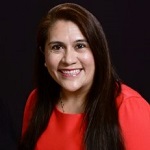Araceli Ortiz
Araceli Martinez Ortiz, PhD, is Executive Director and Research Associate Professor of the LBJ Institute for STEM Education and Research at Texas State University. She holds a bachelor’s degree in Industrial Engineering from the College of Engineering at the University of Michigan, master’s degrees in Engineering Management (Kettering University) and Education (Michigan State) and a PhD in Engineering Education from Tufts University. At Texas State University, she teaches quality assurance and engineering research methods courses in the Department of Engineering Technology and instructional methodology courses in science and mathematics education in the College of Education. A native Detroiter, Araceli worked as an engineer and manager for over fifteen years in the health, automotive and information technology industries for companies such as Abbott Labs, General Motors, Ford Motor Company, and Microsoft. She has always sought leadership development opportunities herself, managing a variety of technical and business projects in North America, Europe, and South America. Araceli has been active in IEEE and with other organizations that support Hispanic Engineers and Women in Engineering. She has also served as a recruiter and mentor for young engineers for many years. As a professor and researcher in engineering education/ leadership in engineering, Dr. Martinez Ortiz leads national intervention and research efforts that explore factors related to how science, technology, engineering and mathematics (STEM) education is designed and delivered and how the STEM workplace impacts women and other historically underrepresented populations in engineering at all levels. She has recently expanded her research in engineering leadership for women to an international level, designing special programming for professional women in STEM in Ethiopia. In 2018, she was invited to serve as a visiting scholar in Sydney, Australia at the University of New South Wales to share her insights in the field through seminars and special workshops. She collaborated with other international educational research colleagues to collect data regarding identity development of professional women to conduct international comparative studies and seeks approaches to support more successful women in the field of engineering.

